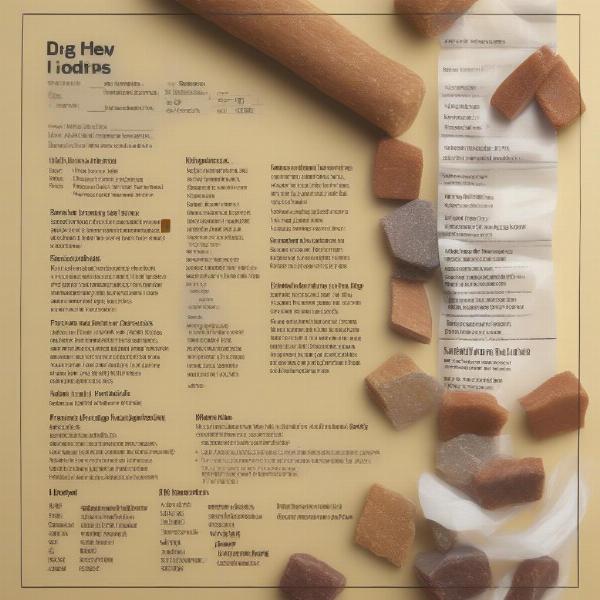Dog chew treats are more than just a way to keep your furry friend entertained. They offer a variety of benefits, from promoting dental health to relieving anxiety and providing essential nutrients. Choosing the right chew treat, however, can be a daunting task with the vast array of options available. This guide will walk you through everything you need to know about dog chew treats, ensuring you can pick the perfect one for your canine companion.
Why Are Dog Chew Treats Important?
Chewing is a natural instinct for dogs. It helps them relieve stress, boredom, and even teething discomfort in puppies. Providing appropriate chew treats can redirect this instinct away from your furniture and shoes! Beyond entertainment, chew treats can contribute to your dog’s overall well-being.
Types of Dog Chew Treats
The pet market offers a wide variety of chew treats, categorized by material, durability, and intended purpose. Some popular types include:
- Bones: Natural bones, like beef or lamb bones, can be a good source of nutrients. However, cooked bones should be avoided as they can splinter and cause internal injuries. Rawhide chews, made from dried animal hides, are another option, but they can pose choking hazards.
- Dental Chews: Designed to promote oral hygiene, these chews often have textures that help scrape away plaque and tartar. Look for the Veterinary Oral Health Council (VOHC) seal of approval.
- Treats for Anxiety: Some chews are specifically formulated to help calm anxious dogs, often containing ingredients like chamomile or L-theanine.
- Long-Lasting Chews: These are ideal for heavy chewers and help prevent destructive chewing behaviors. Antlers, bully sticks, and hard nylon chews fall into this category.
How to Choose the Right Chew Treat for Your Dog
Selecting the right chew treat involves considering your dog’s size, age, chewing habits, and any allergies or health conditions.
Size Matters
A small chew treat can be a choking hazard for a large dog, while a large treat may be too much for a small dog to handle. Always choose a size appropriate for your dog’s breed and weight.
Age and Chewing Habits
Puppies need softer chews to protect their developing teeth, while senior dogs may benefit from softer chews due to potential dental issues. For aggressive chewers, opt for durable, long-lasting options.
Allergies and Health Concerns
Always check the ingredients list for potential allergens. If your dog has any health conditions, consult your veterinarian before introducing new chew treats.
What to Avoid in Dog Chew Treats
Certain ingredients and types of chew treats should be avoided altogether. These include:
- Cooked Bones: As mentioned earlier, cooked bones can splinter and cause serious internal damage.
- Artificial Colors and Flavors: These can be harmful to your dog’s health.
- Excessive Sugar: Too much sugar can lead to weight gain and dental problems.
- Rawhide from Unknown Sources: Poorly processed rawhide can contain harmful chemicals.
 Ingredients list of a dog chew treat
Ingredients list of a dog chew treat
What if My Dog Swallows a Large Piece of Chew Treat?
While most chew treats are designed to be broken down gradually, sometimes dogs can manage to swallow large pieces. If this happens, monitor your dog closely for any signs of discomfort, vomiting, or difficulty defecating. If you notice any of these symptoms, contact your veterinarian immediately.
Conclusion
Dog chew treats can provide a multitude of benefits for your canine companion, from promoting dental health and relieving anxiety to providing mental stimulation and preventing destructive chewing behaviors. By carefully considering your dog’s individual needs and following the guidelines outlined in this article, you can choose the perfect chew treat to keep your furry friend happy, healthy, and entertained.
FAQs
- Are all dog chew treats safe? No, not all chew treats are created equal. Avoid cooked bones, artificial ingredients, and rawhide from unknown sources.
- How often should I give my dog a chew treat? This depends on the type of treat and your dog’s individual needs. Consult your veterinarian for personalized recommendations.
- Can puppies have chew treats? Yes, but choose softer chews designed for puppies.
- What should I do if my dog doesn’t seem interested in chew treats? Try different types and flavors to find one that appeals to your dog.
- Can chew treats replace regular brushing? No, chew treats can supplement but not replace regular brushing.
- Are there any vegetarian chew treats available? Yes, there are chew treats made from sweet potato, carrots, and other plant-based ingredients.
- How can I tell if a chew treat is too hard for my dog? If your dog struggles to make an indent in the treat with their teeth, it may be too hard.
Related Articles on ILM Dog
ILM Dog is your one-stop resource for expert advice on dog care, nutrition, training, and breed selection. We offer a comprehensive range of information to help you provide the best possible care for your furry friend, from puppyhood to senior years. Whether you’re looking for guidance on choosing the right dog food, prednidale 5mg for dogs understanding canine behavior, or biotin for dogs, or finding the perfect chew treat, synulox 250mg tablets for dogs dosage we’ve got you covered. Contact us today for expert advice and support! Email: [email protected] Phone: +44 20-3965-8624. ILM Dog is dedicated to helping you and your dog live a happy and healthy life together.